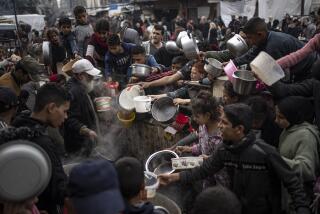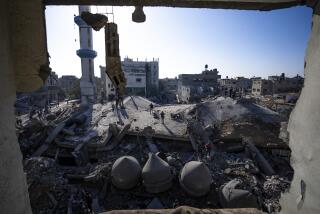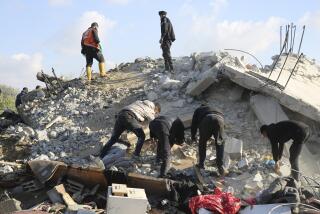Rocket salvos from Gaza prompt Israeli military strikes
As Palestinian militants in the Gaza Strip fired rockets toward Tel Aviv and Jerusalem on Tuesday, Israel struck back at more than 150 targets, the first round of what officials in Jerusalem said would be an open-ended offensive aimed at crushing Hamas, the Islamist group that controls Gaza.
At least 22 Palestinians were reported killed and dozens injured in the largest Israeli military offensive in Gaza since 2012. Five more Palestinians died in an unusual attack by sea on an Israeli military post outside nearby Zikim. There were no reports of Israeli deaths Tuesday, despite the launch of more than 180 rockets, several dozen of which were intercepted by a mobile air defense system.
The rocket fire toward Jerusalem set off sirens and sent residents rushing to shelters. Fans were evacuated from a rock concert at Sultan’s Pool. Rockets landed in the nearby town of Ramat Raziel and set fire to woods outside the community.
Jerusalem was long considered out of the effective range of rockets from Gaza; however, militants there have since obtained more advanced weaponry. “Every Israeli is a target,” said a spokesman for Hamas in the Gaza town of Khan Yunis.
Israeli Prime Minister Benjamin Netanyahu said the barrage on Gaza is meant to make it clear that the “gloves are off” against Hamas. “We will not tolerate rocket fire on our cities and communities,” Netanyahu said as his security Cabinet approved the call-up of 40,000 army reservists to prepare for the possibility of a ground invasion.
The goal is to increase pressure on Hamas and deplete its rocket capabilities, army spokesman Lt. Col. Peter Lerner said. “This will take time, 10,000 rockets don’t disappear overnight,” he said.
The offensive comes after a sharp increase in rocket fire in recent weeks that coincided with an Israeli crackdown on Hamas in the West Bank after three Israeli teenagers were abducted in mid-June. Israel blames Hamas for their kidnapping and slaying and continues to search the West Bank for two suspects. After the youths’ bodies were found, a Palestinian teen was beaten and burned to death in an apparent act of vengeance by Israeli extremists.
Israel and Hamas were “swept into an extensive conflict neither side wanted,” said Shlomo Brom, who heads the Israeli-Palestinian relations program at the Institute for National Security Studies, a Tel Aviv-based think tank.
Eventually, the parties will seek a cease-fire to end the crisis but not before each achieves “a decisive image they can present to their respective publics as a victory,” Brom predicted, adding that “no one ever really wins these rounds.”
Israel could retake the Gaza Strip, from which it withdrew nearly a decade ago, at a “reasonable cost in casualties, although it won’t be a walk in the park. But the question begs, what for? It won’t eradicate Hamas,” Brom said.
Palestinian Authority President Mahmoud Abbas, who recently formed a new government after rapprochement with Hamas, has urged the international community to stop Israel.
On Tuesday, Abbas’ spokesman Nabil abu Rudaineh said the operation was a “declaration of war on Palestinians” and that Israel alone would bear the consequences. “Palestinians have a right to defend themselves by all legitimate means,” Abu Rudaineh said.
Egyptian President Abdel Fattah Sisi called Abbas late Tuesday and assured him Egypt would invest tremendous efforts to achieve an immediate cease-fire, news reports said.
Before the operation began, a statement from State Department spokeswoman Jen Psaki said the U.S. supported Israel’s right to defend itself from rocket fire.
Israeli Defense Minister Moshe Yaalon declared a special emergency situation throughout a 25-mile radius from the Gaza Strip, with summer camps, universities and nonessential activities shut down. Trains to frequently targeted Sderot were suspended despite the town’s rocket-proof train station.
In anticipation of long-range rockets, authorities closed Tel Aviv’s Sde Dov airport, advising that international traffic at Ben-Gurion airport might also be disrupted. Dozens of Israelis were stranded at an airport in Turkey late Tuesday when their carrier decided not to fly into Israel.
With residents of Israel’s south pinned down, public and political pressures on Netanyahu to take military action had mounted in recent days. Yaalon said the operation would continue “until Hamas asks for a cease-fire, on our terms.”
A spokesman for Hamas’ military branch said there would be no cease-fire before Israel released a group of recently re-arrested prisoners, removed obstacles preventing the Palestinian Authority government from functioning and lifted its long-standing blockade of Gaza. Hamas’ political leaders have not appeared in public in recent days, apparently fearful they would be targeted by Israel.
At least seven Palestinians were killed in Khan Yunis when a missile fired from an F-16 leveled the house of the Kaware family, witnesses said. Around midnight, another strike targeted Hafiz Hamas, a local Islamic Jihad commander, killing him and five members of his family.
Among the rockets intercepted by Israel were two aimed at Tel Aviv, about 40 miles north of Gaza, officials said.
Residents of Israel’s south, meanwhile, continued to grapple with daily life under rocket fire. Tamara Cohen of Ein Habsor sent her two daughters, ages 7 and 10, to stay with relatives in central Israel.
“We had relative calm since the previous operation,” she said, explaining that calm less than four miles from Gaza meant one or two rockets a week. “That we could live with. But now things are unbearable.... This has to stop.”
Sobelman is a special correspondent. Special correspondent Rushdi abu Alouf in Gaza City contributed to this report.
More to Read
Start your day right
Sign up for Essential California for news, features and recommendations from the L.A. Times and beyond in your inbox six days a week.
You may occasionally receive promotional content from the Los Angeles Times.






